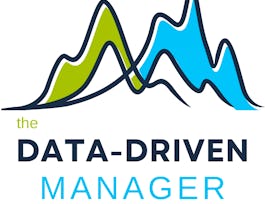In this course, you will get hands-on instruction of advanced Excel 2013 functions. You’ll learn to use PowerPivot to build databases and data models. We’ll show you how to perform different types of scenario and simulation analysis and you’ll have an opportunity to practice these skills by leveraging some of Excel's built in tools including, solver, data tables, scenario manager and goal seek. In the second half of the course, will cover how to visualize data, tell a story and explore data by reviewing core principles of data visualization and dashboarding. You’ll use Excel to build complex graphs and Power View reports and then start to combine them into dynamic dashboards.



Data Visualization with Advanced Excel
This course is part of Data Analysis and Presentation Skills: the PwC Approach Specialization

Instructor: Alex Mannella
Sponsored by IEM UEM Group
103,366 already enrolled
(2,973 reviews)
Skills you'll gain
Details to know

Add to your LinkedIn profile
4 assignments
See how employees at top companies are mastering in-demand skills

Build your subject-matter expertise
- Learn new concepts from industry experts
- Gain a foundational understanding of a subject or tool
- Develop job-relevant skills with hands-on projects
- Earn a shareable career certificate


Earn a career certificate
Add this credential to your LinkedIn profile, resume, or CV
Share it on social media and in your performance review

There are 4 modules in this course
During this first week, you are going to learn about the development of data models and databases. We will cover the components of data sets and the relational database models, database keys, relationships, and joins. We will also look at a tool called PowerPivot that is used to import and prepare data to build relational models, as well as visualize data. By the end of the week, you will have a working knowledge of how to develop a data model. Be sure to complete lessons in the order in which they are sequenced in the course.
What's included
16 videos4 readings1 assignment1 discussion prompt
This week, we are going to explore three different analytical methods used to help model different scenarios and deal with variable uncertainty. These methods are scenario analysis, sensitivity analysis and simulation. We’ll look at what each method is and then go deeper into why and how you use each. Following some guided demonstration, you’ll be given a chance to practice in an Excel workbook and demonstrate what you’ve learned.
What's included
9 videos1 reading1 assignment
This week we are going to focus on data visualization. We will start off by discussing data visualization basics, outlining the theory and concepts behind data visualization. We will also discuss how to enable effective story telling through the correct selection, creation, and presentation of tables and charts. You’ll get a chance to learn how to create detailed graphs and charts to effectively tell a story about your data.
What's included
12 videos1 reading1 assignment
In the final week of this course, you are going to learn how to create a dynamic dashboard. We are going to discuss how to establish a good understanding of your audience and how to collect key requirements in order to determine what type of dashboard to build. We will talk about some guiding design principles and things to consider when building a dashboard. You’ll have a chance to practice everything you learn this week by creating your own functional dashboard in Excel.
What's included
8 videos2 readings1 assignment
Instructor

Offered by
Why people choose Coursera for their career




Learner reviews
2,973 reviews
- 5 stars
80.36%
- 4 stars
16.64%
- 3 stars
1.98%
- 2 stars
0.53%
- 1 star
0.47%
Showing 3 of 2973
Reviewed on May 15, 2020
Just so much to learn... With the lessons here, an activity that would cost 30min time to execute should take 10min or less if the tools are utilized... Excel has lots of magic hidden wands!
Reviewed on May 6, 2020
One of the best online courses that I ever have seen and it helps me to gain more knowledge in data visualization and analytics and it also gears up my excel skills.
Reviewed on Mar 22, 2019
This course took me from Basic level knowledge of Excel to a really advanced level. Course practice exercises are developed in a very appropriate way to teach the advanced level.
Recommended if you're interested in Data Science

Microsoft

University of Colorado Boulder

Edureka

University of Colorado Boulder

Open new doors with Coursera Plus
Unlimited access to 10,000+ world-class courses, hands-on projects, and job-ready certificate programs - all included in your subscription
Advance your career with an online degree
Earn a degree from world-class universities - 100% online
Join over 3,400 global companies that choose Coursera for Business
Upskill your employees to excel in the digital economy


